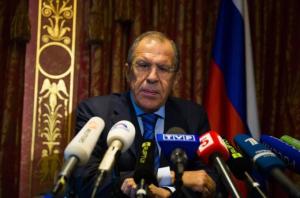EU pushes Libya peace as IS claims deadly blasts
Tunis (AFP) – The EU urged Libyan politicians to back a unity government Thursday, as the Islamic State group claimed suicide bombings that killed dozens and sparked fears of a jihadist expansion on Europe’s doorstep.
European Union foreign affairs chief Federica Mogherini also said the EU would give Libya 100 million euros ($108 million) to battle IS, saying the security situation “needs to be tackled immediately”.
She told reporters the funds would be available from the first day the unity government comes to power.
Mogherini met separately in a Tunis suburb with Fayez al-Sarraj, a businessman who was named in a UN-brokered national unity government as prime minister designate, and Libyan lawmakers.
IS said one of its members, Abdallah al-Muhajer, “detonated a truck bomb in the middle of a base belonging to the apostate Libyan forces in the city of Zliten… killing nearly 80 of them and wounding 150”.
A security source had said more than 50 people were killed in the attack on a police training school, which left buildings charred and turned cars into twisted wrecks.
It was the deadliest single attack in Libya since the 2011 revolution that toppled longtime dictator Moamer Kadhafi.
IS, which launched an offensive against Libya’s oil heartland this week, also said it was behind Thursday’s suicide bomb attack on a checkpoint in Ras Lanouf, home to a key oil terminal on the country’s northern coast.
..View gallery Libyan Prime Minister Fayez al-Sarraj (L) and EU foreign policy chief Federica Mogherini (R) attend …The Red Crescent said six people, including a baby, died in that attack.
– ‘IS taking advantage’ –
Fears the jihadists are establishing a new stronghold on Europe’s doorstep have added urgency to efforts to bring together warring factions in a country beset by chaos since 2011.
Libya has had rival administrations since August 2014, when an Islamist-backed militia alliance overran Tripoli, forcing the government to take refuge in the east.
In December, after months of negotiations, a minority of lawmakers from both sides signed on to the UN-brokered national unity deal which has yet to win the full support of the two legislatures.
Analysts say these divisions are bolstering the position of IS.
“The situation has become very worrisome… with IS taking advantage of the chaos, the collapse of the central authorities and wars by proxy,” said Karim Bitar, head of research at the French Institute of International Relations.
..View gallery Libyans inspect the site of a suicide truck bombing on a police school in the coastal city of Zliten …The international community has been pleading for months with Libya’s rival parliaments to embrace the UN-brokered deal.
Mogherini said she had “fruitful and concrete” talks with Libyan politicians on how the EU can help the future government in the “fight against terrorism and namely against Daesh (IS)”.
“The best response to terrorism especially to Daesh will be a Libyan response” and a government to unite Libyans, she said, adding that the EU could help provided “training and advising”.
UN Secretary General Ban Ki-moon condemned Thursday’s attacks and also urged unity among Libyans.
“These criminal acts serve as a strong reminder of the urgency to implement the Libyan political agreement and form a government of national accord,” Ban said.
– ‘Unity the best way’ –
“Unity is the best way for Libyans to confront terrorism in all its forms.”
Bitar said the establishment of a national unity government was a matter of “urgency” but he warned international efforts could fail due to “numerous suspicions” on the ground.
Mohamed Eljarh, a non-resident fellow with the Atlantic Council’s Hariri Centre, agreed.
He said the latest attacks claimed by IS “would not end the feud in Libya, but could at best result in reducing the trust deficit between the various armed and political groups as they attempt to cooperate and help each other in the face of IS’s expansion”.
The heads of Libya’s parliaments have warned the UN-brokered deal has no legitimacy and that the politicians signing the agreement represented only themselves.
The chaos in Libya since 2011 has also led to its rise as a stepping stone for migrants crossing the Mediterranean to Europe.
The IS offensive against the oil terminals in Ras Lanouf and nearby Al-Sidra in Libya’s so-called “oil crescent” came as IS has tried for weeks to push east from its stronghold in Sirte.
Officials have warned the already crumbling state could be paralysed if IS, which is reported to have at least 3,000 fighters in Libya, seize control of oil resources.
In a report to the UN Security Council in November, International Criminal Court chief prosecutor Fatou Bensouda said IS was responsible for at least 27 car and suicide bombings in Libya in 2015
http://news.yahoo.com/claims-suicide-bombing-killed-dozens-libyas-zliten-170127394.html


